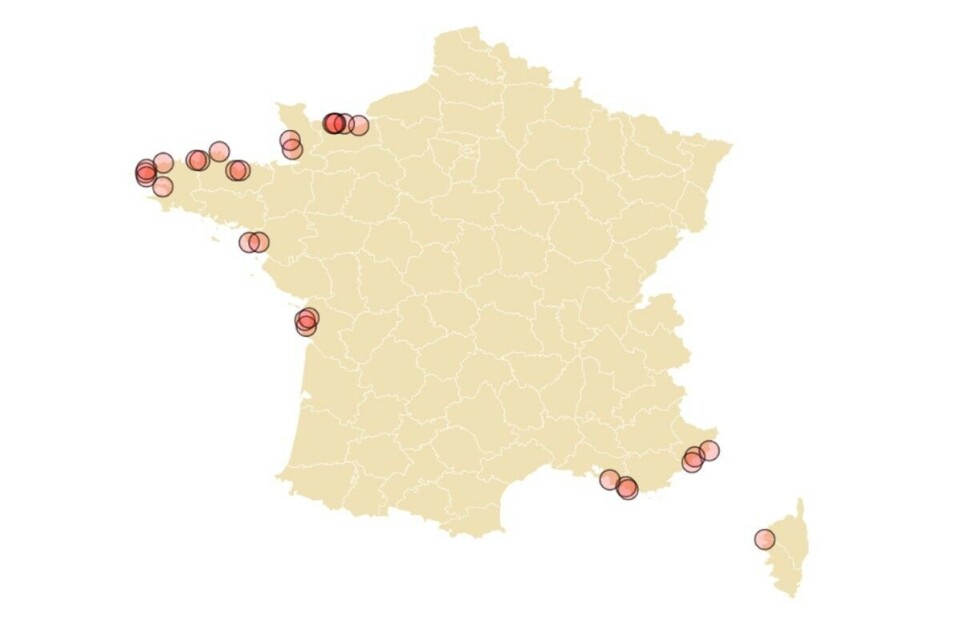-
Pistes closed, confinement orders: Alpine resorts deal with avalanche risk
Increased snowfall this weekend may cause further closures as busy school holiday season continues
-
Former French Interior Minister announces 2027 presidential candidacy
Bruno Retailleau recently asked prefectures to be tough on immigration
-
Ryanair axes Dublin-Rodez route but London connection retained
“We are disappointed but had no say in decision” say airport authorities
Which beaches should you avoid in France this summer?
The water quality at the vast majority of French beaches is deemed excellent. But there is still a small number to steer clear of

A list containing some of France’s most-polluted beaches has been unveiled to help summer visitors decide where to bathe.
Published by the newspaper Le Figaro, it shows the vast majority of French beaches are ranked as ‘excellent’.
Its study looked at more than 1,800 beaches whose water quality is regularly checked by regional health agencies in France.
The media organisation has provided a searchable, interactive map (in French and behind a paywall) that allows you to see beaches near you or check the quality of those you may visit on holiday.
Visitors are advised to check for reports on the quality of the water before diving in, France’s health ministry warns, to avoid bacteria like E.coli, intestinal germs, and problems that can affect the eyes, throat, and respiratory system.
A European directive requires bathing water to be checked and the result of these analyses enables authorities to classify beaches into four grades based on their water quality.
The categories are ‘excellent’, ‘good’, ‘sufficient’, or ‘insufficient’, and they are based on the microbiological analysis results for the current year and the three previous ones.
Mediterranean
On France’s Mediterranean coast, eight beaches in Provence-Alpes-Côte-d'Azur are primarily affected by poor (‘insufficient’) quality water. These notably include beaches in Saint-Cyr-sur-Mer, Saint-Laurent-du-Var, Menton, Marseille, Bandol, and Antibes.
On June 21, swimming at Gravette beach, Antibes, was suspended due to high levels of enterococcus bacteria in the water.
Some beaches in Bandol, including Eden-Roc and Barry, have been closed since March and will remain so throughout the summer, for similar reasons.
In contrast, beaches of excellent quality water in the area include those in the communes of Grimaud, Ramatuelle, Roquebrune-sur-Argens, Sainte-Maxime, and Saint-Mandrier-sur-Mer.
Occitanie and Corsica
The beaches in these regions tend to be of high quality, with none being judged ‘insufficient’.
The communes of Agde, Canet-en-Roussillon, Palavas-les-Flots, and Sète offer ‘excellent’ quality spots, while most of the beaches in Corsica are also classified as ‘excellent’.
Read also: Riptides on French coast: How to avoid and what to do if caught
Nouvelle-Aquitaine
Some water, however, suffers from higher-than-ideal levels of pollution.
For example, in the Nouvelle-Aquitaine region, the beaches at Bourcefranc-le-Chapus, Port-des-Barques, and Fouras are of ‘insufficient’ quality.
In contrast, beaches a few kilometres away in Ile d'Oléron and Ile d'Aix are much better. In Gironde there is Lège-Cap-Ferret, in Landes, Soorts-Hossegor; and Anglet in the Pays Basque, all of which have a number of beaches with ‘excellent’ water quality.
Normandy and Hauts-de-France
In Normandy, the beaches of Agon-Coutainville and Coudeville-sur-Mer have ‘insufficient’ water quality, in contrast to Granville and La Hague, which have many sites with ‘excellent’ water quality.
Hauts-de-France has fewer swimming spots compared to other regions, and while none of them are ranked as of ‘insufficient’ quality, the proportion of beaches of ‘excellent’ quality is low. They tend to be rated ‘good’ or ‘sufficient’.
Brittany
Some beaches in Brittany do not fare well. That includes those at Lanildut, Saint-Michel-en-Grève, and Saint-Brieuc are of ‘insufficient’ quality.
The beach at Saint-Michel-en-Grève even saw the first suspected case of death caused by green algae, in 1989, when hydrogen sulphide, a toxic gas emitted by decomposing algae, is thought to have caused the death of a 27-year-old jogger.
The beach at Saint-Brieuc is also seeing problems linked to invasive green algae, with access to the beach restricted.
In contrast, towns like Saint-Malo, Concarneau, and Plounéour-Brignogan-Plages have around a dozen beaches that are deemed to be of ‘excellent’ quality.
Pays de la Loire
The beaches at Pornic and Saint-Hilaire-de-Riez fare better than those at Pouliguen and Saint-Nazaire, as the latter two are rated of ‘insufficient’ quality in the Le Figaro list.
Related articles
These have been ranked France’s most environmentally friendly beaches
Green, yellow, red, purple: New safety flag system for French beaches
























